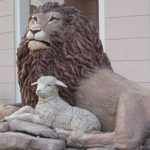“Abba Macarius was asked, ‘How should one pray?’ The old man said, ‘There is no need at all to make long discourses; it is enough to stretch out one’s hands and say, ‘Lord, as you will, and as you know, have mercy.’ And if the conflict grows fierce, say, ‘Lord, help!’”
Roberta Bondi includes that story in her wonderful book, To Pray and to Love, and comments: “For most of us who have grown up without a tradition of private prayer that goes beyond reciting, ‘Now I lay me …’ and the Lord’s Prayer, or praying for a specific need in a particular situation, the whole subject of prayer can be baffling and painful.”
 Bill LeonardI’m trying to learn to pray, again. Yes, I’m one of those people who learned to pray, “Now I lay me down to sleep” and “Our Father who art in heaven” at home and in church before I learned to read. I can’t remember when I didn’t know them. Over the years, I’ve kept praying, confessing that engaging in and being engaged by prayer can indeed be “baffling and painful.”
Bill LeonardI’m trying to learn to pray, again. Yes, I’m one of those people who learned to pray, “Now I lay me down to sleep” and “Our Father who art in heaven” at home and in church before I learned to read. I can’t remember when I didn’t know them. Over the years, I’ve kept praying, confessing that engaging in and being engaged by prayer can indeed be “baffling and painful.”
I’m still learning to pray. What follows are random reflections born of “prayer-full” lessons along the way:
First, learning to pray compels us to ask something about the nature of God: Is there a One, and does that One hear our prayers?
Can God find all 9 billion of us?
In For the Time Being, Annie Dillard quotes Nelly Sachs’ inquiry, part prayer, part accusation: “Who is like You, O Lord, among the silent, remaining silent through the suffering of his children?” Even a most familiar hymn slips in a little wedge of irony amid grand affirmation of Divine sovereignty: “Holy, holy, holy, though the darkness hide thee ….” Can God find all 9 billion of us? And care? Didn’t the earliest disciples ask similarly: “Lord, teach us to pray,” seeking Jesus’ own sure-fire formula for ensuring God hears and actually responds?
Second, when it comes to prayer, words usually get in the way.
The Apostle Paul wrote: “We do not know how to pray as we ought, so the Spirit makes intercession for us with groanings that cannot be uttered.” I love that King James Version word, “groanings.” Been there; done that! Perhaps none of us really knows how to pray “as we ought.” Our words are frighteningly sexist, racist, insensitive, manipulative, limited, conditioned, broken and generally inadequate in some form or another. Groanings in the Spirit may be our only real hope.
Sign up for our weekly edition and get all our headlines in your inbox on Thursdays
Getting hold of God
Third, in most religious communities, perhaps all of them, there are some people who, in the words of the old preachers, “know how to get hold of God.”
They reflect a depth of prayer and spirituality so clear that when the rest of us need to be sure we can “get through,” we go looking for them. In my church, such individuals often are identified as “mothers of the church,” women whose exemplary faith and strength of character undergird the grace of their praying. In the early Christian eras, “widows” apparently held something of the same distinction—people of “peculiar piety” whose prayers were highly valued by the church. They were and remain people who stick their spiritual necks out, gamble—by faith—that God hears, and cultivate the presence and discipline of prayer.
Fourth, at its best, the church—the communion of saints—prays with us and for us, especially when we cannot pray ourselves.
On some Sundays, I can’t even utter the Lord’s Prayer, but the gathered church does it for me.
Sometimes, life is so terrible prayer won’t come, and we must hold on to the prayers others still can offer. On some Sundays, I can’t even utter the Lord’s Prayer, but the gathered church does it for me. Sometimes, that’s all I’ve got, and it is enough. Kathleen Norris says: “Good liturgy can act like an icon, a window into a world in which our concepts of space, time and even stone are pleasurably bent out of shape. Good liturgy is a living poem, and ceremony is the key. … Good ceremony makes room for all the dimensions of human experience in the hope that, together, we will discover something that transforms us. … Ceremony requires that we work with others in the humbling give-and-take of communal existence.”
Fifth, that said, I’m still struck by the fact some Christians demand to pray out loud “in Jesus’ name” at government-related ceremonies.
Since I’ve been praying “in Jesus’ name” over 60 years, and since my prayers are offered to God and not the U.S. government, if Jesus still doesn’t know I’m praying in his name, then I’m in real trouble.
Learning to change
Finally, continuing to learn to pray may help us continue to learn to change.
Bondi cites Moses, “the great black Abba from the Sudan,” who admonished: “If a (person’s) deeds are not in harmony with his (or her) prayer, (that person) labors in vain. The brother said, ‘What is this harmony between practice and prayer?’ The old man said, ‘We should no longer do those things against which we pray.’”
Amen.
Bill Leonard is the James and Marilyn Dunn Professor of Church History and Baptist Studies at Wake Forest University’s School of Divinity. His column is distributed by Baptist News Global.














We seek to connect God’s story and God’s people around the world. To learn more about God’s story, click here.
Send comments and feedback to Eric Black, our editor. For comments to be published, please specify “letter to the editor.” Maximum length for publication is 300 words.